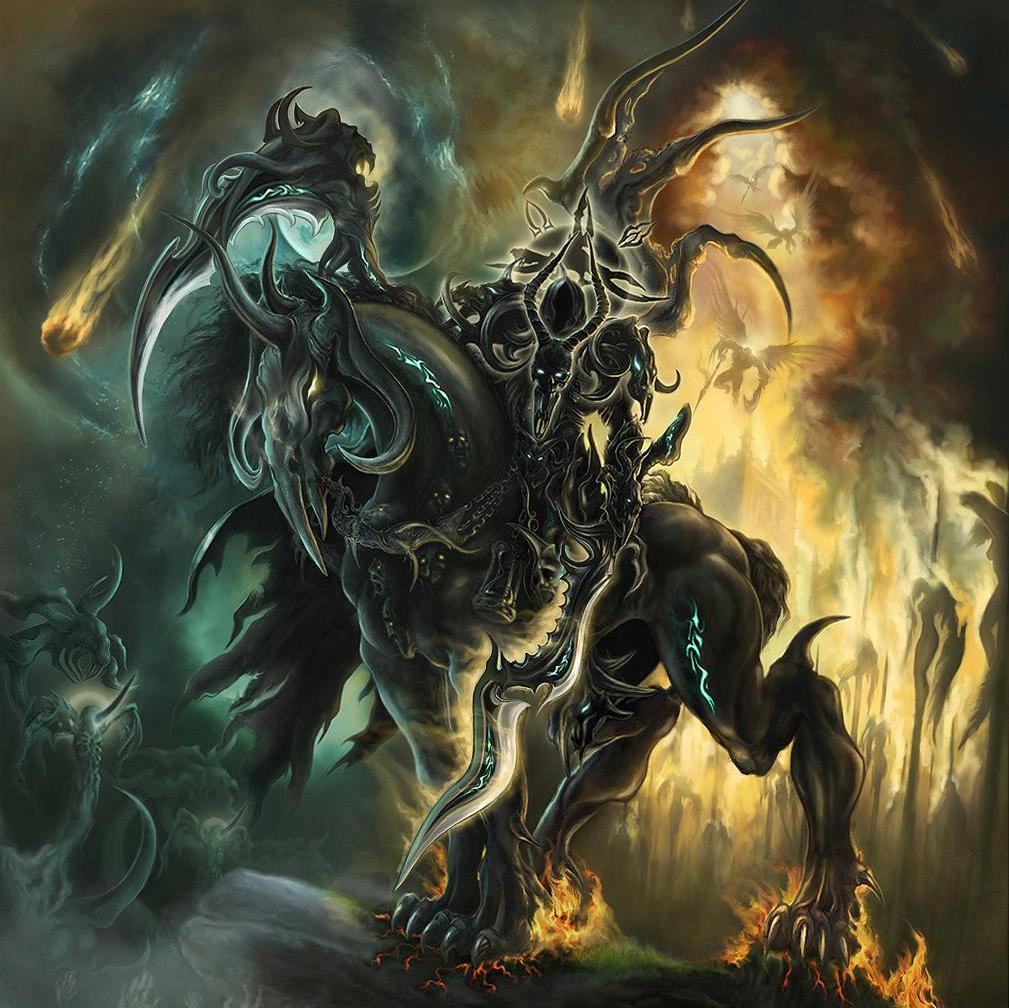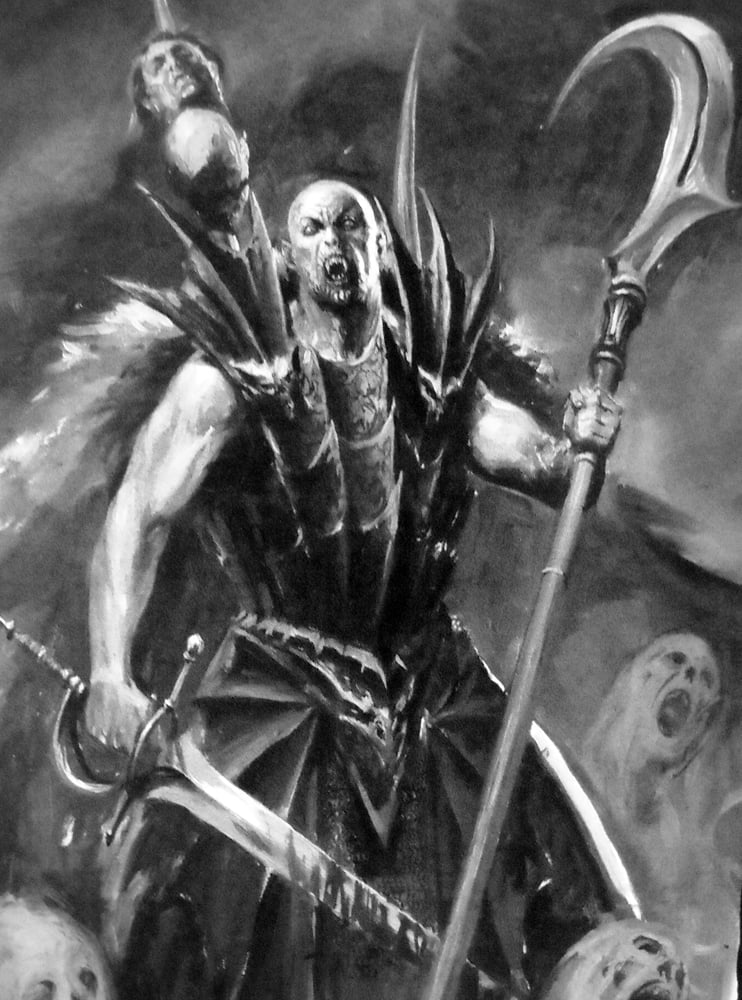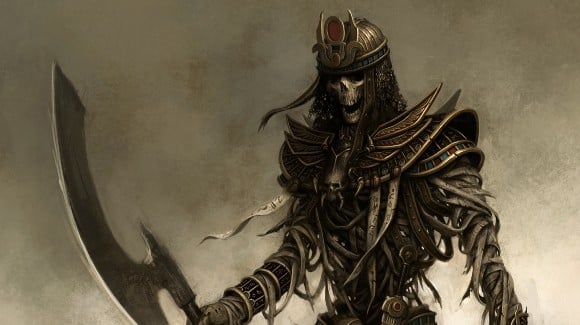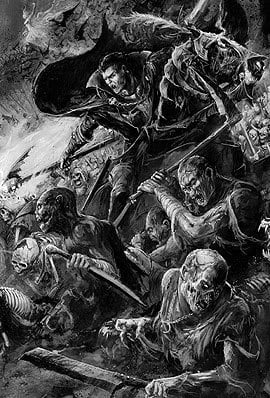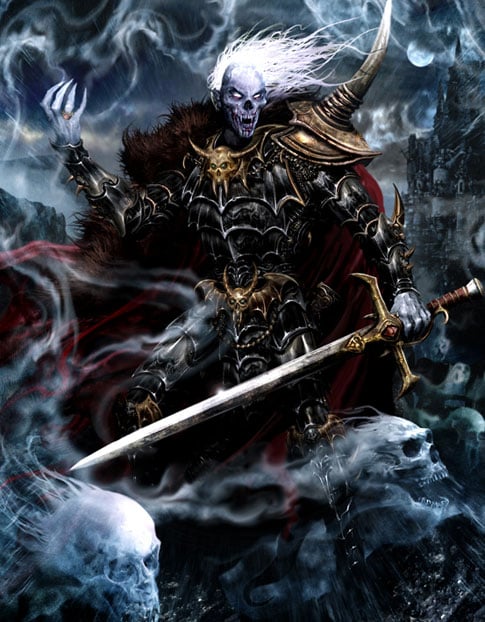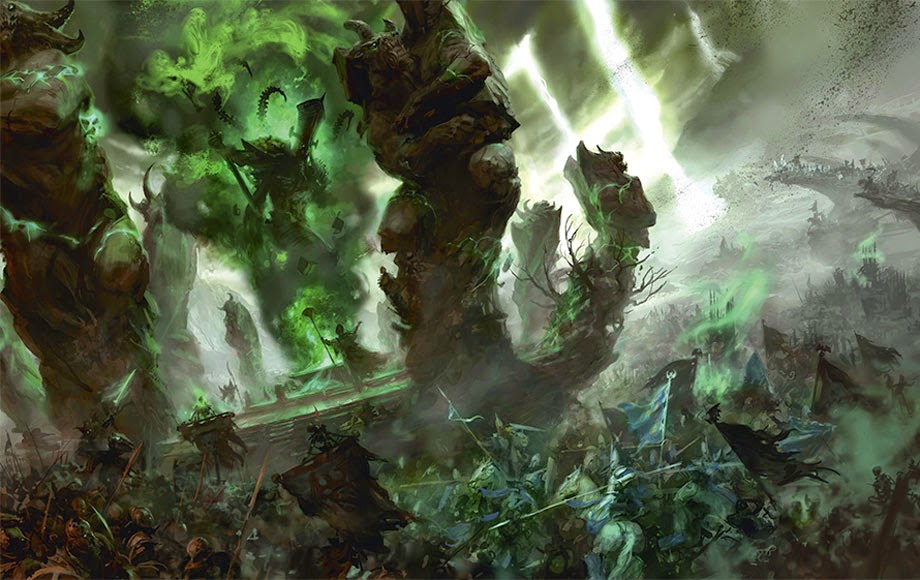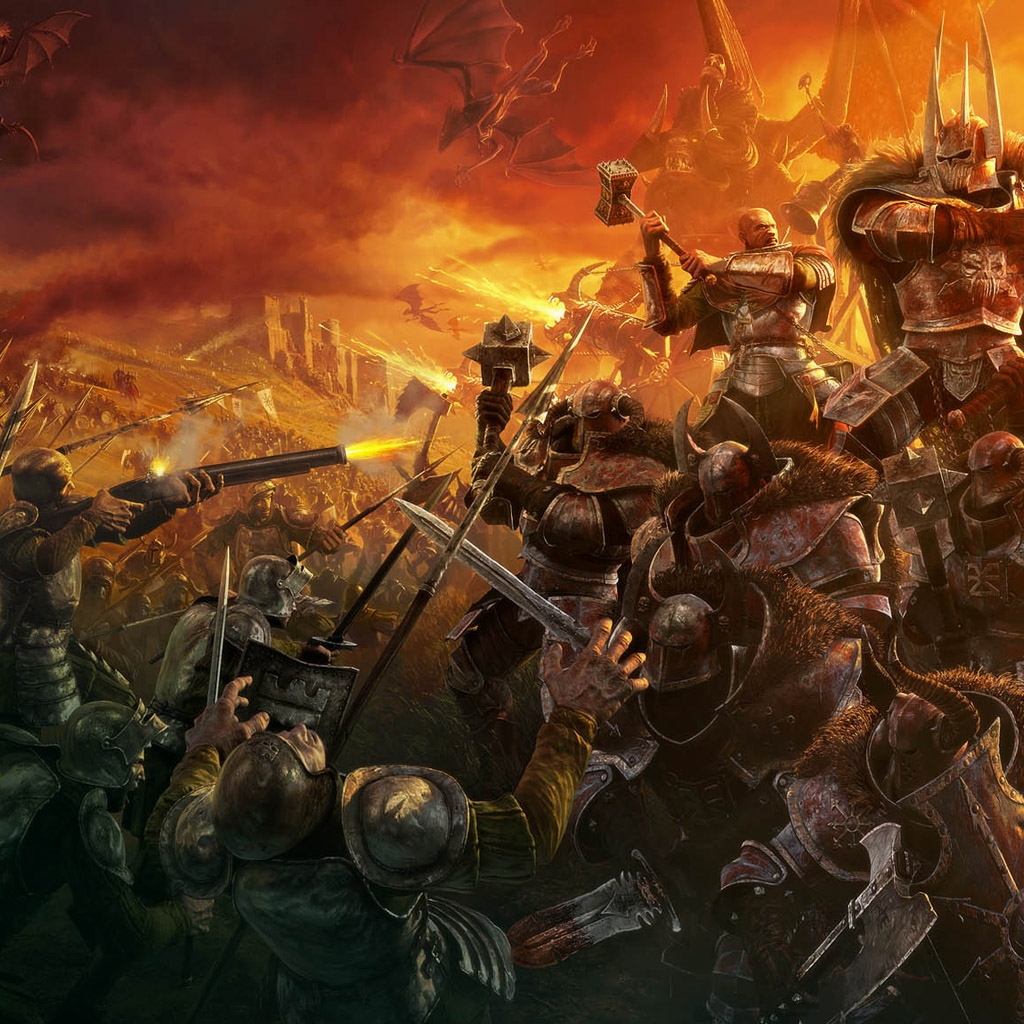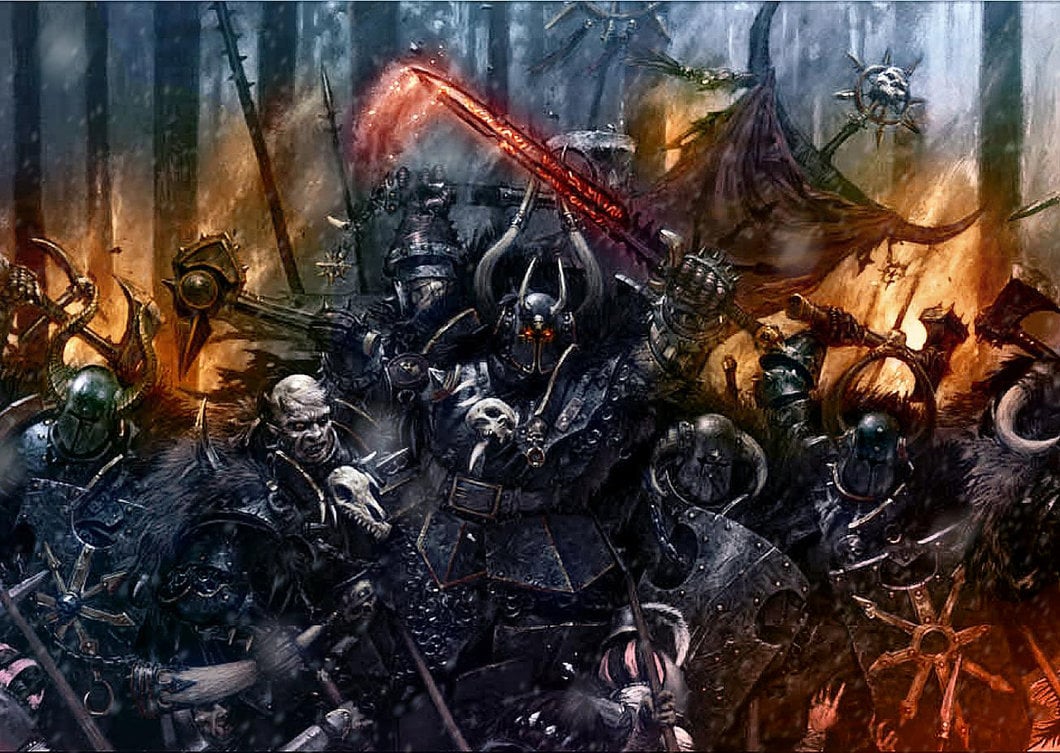WFB TACTICA: Nagash Characters and Units – Winners and Losers
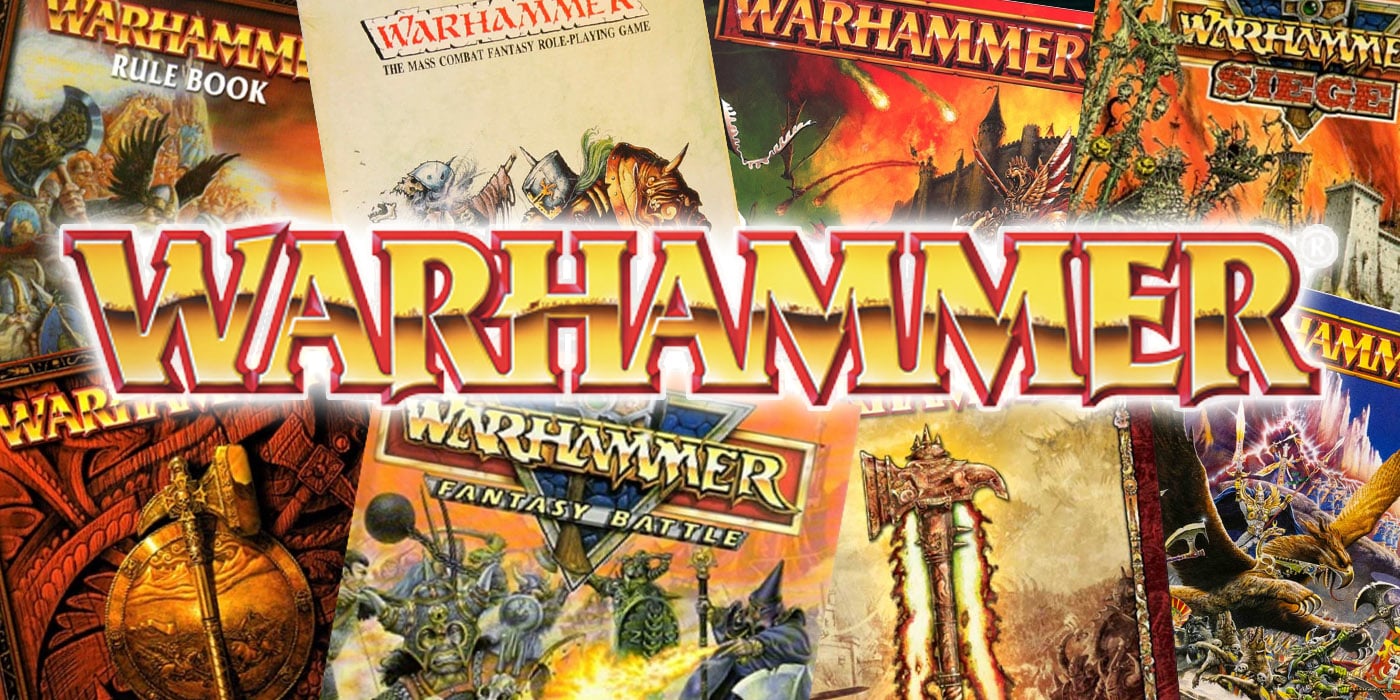
The End Times have come with a host of returning or updated special characters that are each a master of the battlefield in their own way. Time to dive in!
The Nagash and End Times series has kicked off to a fantastic start and I can’t wait for future titles in the series – imagine if Tyrion, driven by grief, is forced to draw the Widowmaker and truly takes up the mantle of Aenarion reborn? – but right now the content in front of us simply amazing. These are some of the strongest characters in the game now and I can’t wait to see them take to the fields of war!
End Times New Units
Mannfred Von Carstein, Mortarch of Night
The most successful of all the Von Carsteins (sorry Vlad) has been given a significant overhaul of his rules, restricting him to a single mount option and consolidating his rules into the “master” version. His points cost has increased by just over a century’ worth of points, though I think many would argue Mannfred comes out on top for the most part with this trade. Doubling his Wounds to a ridiculous ten, gaining Toughness 6 and having a whopping nine attacks base as a result of his combined profile with a Dread Abyssal signals a huge buff in the basic profile alone. Add in that Mannfred now has the Monster unit type and is thus immune to Killing Blow and can also perform Thunderstomps and the sheer durability and killing power of Nagash’s right hand man has doubled or more. His magic sword works the same as before by providing extra magic or dispel dice in the ensuring magic phase based on the number of unsaved wounds it inflicts, though this has thankfully (for opponents) been capped at five generated in the one turn.
His Armour of Templehof remains and serves to make Mannfred by far the most durable of the three mounted Mortarchs, having the most wounds and the best saving throw with a 4+ armour save. The Hunger remains under a different name, while his incredibly useful Master of the Black Arts has also survived the cull of Vampiric Powers – on that note, Mannfred has sadly lost the Dark Acolyte and Summon Creatures of the Night abilities. Truthfully though the main one was always the one he managed to keep and so this really won’t affect his crazy casting potential, but losing out on a wide range of spells certainly will. The big trade-off with Mannfred in his new unit entry is that he is no longer a Loremaster of both the Lore of the Vampires and the Lore of Death, though he is capable of mixing up the lores he generates spells from and could be seen as more versatile in a sense with the addition of the Lore of Undeath. Considering that Mannfred triples the range of any Lore of Undeath spells he uses this does help to soften the blow, while Mannfred’s combat prowess can be further expanded with the all-new Dark Cunning special rule. This allows Mannfred to sacrifice up to three power (but not dispel) dice and generate the equivalent number of additional Attacks, allowing him to exceed the usual stat limit of ten and have up to a huge twelve Strength 5, Weapon Skill 7, Initiative 7 attacks, all in addition to D6 automatic hits per the Thunderstomp special rule. Did I mention that each unsaved wound he causes provides him with an extra power or dispel dice in his next magic phase, and that he can re-roll one dice when determining the strength of the Winds of Magic? As George Takei would famously say, “Oh myyyy”.
The end result of all the tweaks is that Mannfred is now a combat monster that will slaughter light to medium infantry and cavalry with impunity through a ridiculous number of attacks and has almost unprecedented control over the magic phase. He can freely boost his combat abilities by sacrificing power dice which can in turn be converted to bonus power or dispel dice in the proceeding Magic phase, all the while having an innate re-roll to go from a terrible snake eyes to a six and one for magic dice and so on. He is still a Level 4 Wizard that can freely take spells from up to three different lores in the one game and is unbelievably difficult to kill with ten wounds at Toughness 6 and a 4+ armour save, able to heal a wound on himself every time a spell from the Lore of the Vampires is cast within 12″. While losing Loremaster of two very powerful spell lores is a huge hit to his usefulness, doubling his damage output and survivability all the while increasing his power or dispel dice generation to a ridiculous level makes for a character that is significantly improved over his previous version. Oh, and if it wasn’t obvious, being on a flying mount with all those crazy stats is insane – Mannfred is downright terrifying now and will no doubt be one of the biggest targets on the battlefield for any sane opponent!
Competitive? Yes.
Arkhan the Black, Mortarch of Sacrament
Of the three Mortarchs mounted on Dread Abyssals, Arkhan is perhaps the least impressive at first glance with seemingly neutered combat and magic capabilities compared to both Neferata and Mannfred, respectively. However, Arkhan still manages to pack on the value and makes for one heck of a tough nut to crack when fielded against armies favouring fragile infantry such as Skaven or the various Elf factions, even if his rules are arguably inferior to what they were in the Tomb Kings army book. His profile is undoubtedly the weakest of the three mounted Mortarchs with his offensive capabilities limited to seven Weapon Skill 4 attacks at Strength 5 and Initiative 3; the offset here is that each unsaved wound Arkhan causes with his magic weapon restores a single lost wound to him up to a total of four per close combat phase. Throw in his own form of a Vampires’ the Hunger special rule and eight Toughness 6 wounds and Arkhan is incredibly tough, with fodder units that lack Poisoned Attacks or high Strength proving to be dead meat against a model that heals itself by killing enemies. It is unclear if the Thunderstomp provided by having the Monster unit type is affected by Arkhan’s magic weapon, though I personally feel that only Arkhan’s regular attacks can restore lost wounds.
Still, despite mashing lightly to medium armoured units I can’t really call Arkhan a high quality melee model considering his poor Weapon Skill and Initiative make him very susceptible to attacks from well armoured or high Strength enemies, while high Initiative Poisoned attacks are his bane much like Neferata. Still, eight wounds at Toughness 6 is nothing to sneeze at even if Arkhan only has a pitiful 6+ armour save, though his ability to restore wounds can sadly only carry him so far – especially against an elite force such as Warriors of Chaos or an Empire cavalry-based army. Arkhan does have the equivalent of the Vampiric special rule by natively being able to march unlike other Undead and also suffering one less wound as a result of the Unstable special rule, though I feel his best traits are nonetheless centred around the Magic Phase as before. Arkhan is a Level 4 Wizard that can freely mix his spell from the Lore of Death or the Lore of Undeath with the latter lore proving a particularly good fit seeing as Arkhan’s unique Mortarch special rule allows him to double the points worth of summoned models. If this ability doesn’t already remind you of Nagash (which makes sense as Arkhan is his lieutenant), then his unique staff will cement that thought; Arkhan can store two unused power dice in his staff and add them to the power pool in a future magic phase, using them to potentially cast a spell with eight dice involved.
Essentially Arkhan the Black reads as a Mortarch with stripped down magical abilities compared to Mannfred and drastically impaired combat capabilities when put side by side with Neferata, but his special benefits with the Lore of Undeath make him a great fit for an army list that is based heavily around summoning. Unfortunately, that is just the problem I take with Arkhan the Black. He doesn’t come anywhere close to Mannfred’s sheer dominance of the Magic Phase with the re-roll for determining the strength of the Winds of Magic, an extra spell lore to use, gaining bonus power or dispel dice for future magic phases based on kills he makes in close combat and even doubling the range of all Lore of Undeath spells. That Mannfred is a far better fighter makes his “kills to dice” special rule far more useful and likely to activate than Arkhan’s, even if Arkhan is superior at specifically casting summoning spells.
It doesn’t help that Arkhan also has a weakened save and two less wounds than Mannfred with little really to make up for it. I feel that of the three Mortarchs Arkhan definitely vies mostly with Neferata than Mannfred at a competitive level, and paying roughly three hundred points more over his Tomb Kings incarnation for what amounts to a reduced wizard level but boosted survivability and offensive prowess is not as advantageous as it has proved for Mannfred. I’ll rate Arkhan a competitive choice if only because he is still a good mix of flying combat monster and Level 4 Wizard, but if you are on a budget and want the best of the three mounted Mortarchs then I feel Mannfred has several clear advantages over both Arkhan and Neferata. Doubling the amount of points summoned by the Lore of Undeath spells is a huge advantage to have but I just don’t feel it makes up for Mannfreds’ general magical superiority, especially as Mannfred doesn’t have to rely on causing unsaved wounds in close combat to heal himself with access to the Lore of the Vampires.
Competitive? Yes.
Neferata, Mortarch of Blood
The Queen of Blood has returned to the realm of the living, though it comes at the cost of her rules not really reflecting the true power of the First Vampire. For any lover of the background it should go without saying that Neferata should be the most powerful Vampiric character perhaps second only to Abhorash, but instead we get rules that are priced to make her roughly equivalent to the admittedly awesome latest version of Mannfred. Still, I guess it is kind of hard to complain seeing as Neferata is still easily the best combat Vampire Lord equivalent character available to the Undead by quite a hefty margin, though she does pay for this privilege with some heavy weaknesses. Like Arkhan, Neferata is restricted to a paltry 6+ armour save and must instead rely on the otherwise impressive eight wounds at Toughness 6 for protection, though unlike Arkhan she can at least use the Lore of the Vampires to heal herself with the lore attribute.
As a spell caster Neferata is a Level 3 Wizard that can mix her spells freely between up to four different spell lores – a common trait among the Undead Legion special characters, by the way! – as she can use the Lore of Undeath, the Lore of the Vampires, the Lore of Death or the Lore of Shadow as she sees fit. This makes her the equal most versatile spell caster in the army in terms of spell selection with Vlad Von Carstein outside of Nagash himself, while she is similarly and uniquely able to use the Lore of Shadow just like Vlad – a spell lore that is otherwise immensely restricted for the Undead Legions. Being a Level 3 Wizard isn’t necessarily a death sentence for the character competitively as Vlad Von Carstein proves (to be discussed later) and Neferata’s spell selection does give her an advantage over Arkhan as far as versatility is concerned. Still, she is undoubtedly the weakest spell caster of the three mounted Mortarchs, even if her staff provides her with a cool little extra effect. Every time a hex, magic missile or direct damage spell is successfully cast on an enemy unit, Neferata rolls a D3 and inflicts that many Strength 5 automatic hits on the target unit in addition to the normal effects of the spell. Seeing as the Lore of Shadow and the Lore of Death are comprised almost entirely of those kinds of spells the extra wounds this causes will start to stack up over the course of a six turn game, though I will say the damage is more of a little extra rather than anything to seriously worry your opponent.
What will frighten your opponent however is Neferata’s combat prowess and I can confidently state that I would be lying if I said I was disappointed by her insane damage potential against medium to lightly armoured foes. She is the best of the three in close combat unless Mannfred sacrifices some power dice and benefits from a bunch of extra effects provided by spells or friendly units, but even so Neferata’s unique magic weapon help to make her a near unparalleled challenge monster – albeit one you pay heavily for. Weapon Skill 8 is above average for a Vampire Lord, as is Initiative 9 and 8 Attacks that, when combined with Always Strikes First and base Strength 5, make Neferata the monstrous and vampiric equivalent of a High Elf Prince caught in a frenzied blood-lust. She will hit most enemies in the game on 3s with re-rolls and will butcher anything with a 3+ armour save or worse, while even 2+ armoured opponents cannot feel secure behind such a huge range of attacks that are so likely to hit.
That she can buff herself with guaranteed re-rolls to hit and to wound against opponents with high Toughness or Always Strikes First through the Lore of the Vampires can make her among the nastier close combat characters in the game. Toss in a Thunderstomp at Strength 5 and Neferata will gorge through anything not hiding behind a 1+ armour save with an efficiency very few characters in the game could ever hope to match. Her magic dagger seals the deal though as any model wounded but not slain by it reduces their Strength, Toughness and Attacks by 1 for the rest of the game, basically her way of leveling the playing field against Chaos Lords and other tough combat characters. While this can only affect any single model once per game it nonetheless means that Neferata can and should win any protracted combat against other armies’ dedicated melee Lords, especially with the effect her divine beauty has on mortals. Much like a Chaos Lord with the Mark of Nurgle, Neferata has a ridiculous Weapon Skill 8 with a -1 to hit penalty against her in close combat that, considering her Toughness 6 and 8 Wounds, makes her darned near impossible to beat in a challenge or general close combat. Need I even mention that this -1 to hit modifier also applies to shooting attacks given that the wording specifies “attacking” and not attacks of either variety, meaning that massed Poisoned shooting aside a gun-line will have a tough time against her? She does have Flying movement for a reason folks!
If that all wasn’t enough, Neferata will spawn a hero-level Vampire the first time she kills an enemy in a challenge, regardless of whether it was a mere unit champion or a terrifying Daemon Prince. A free and powerful hero choice that provides a single additional spell and a wealth of Strength 5 attacks with a good profile? Yes please, sign me up to the Lahmian court now! Though she is the weakest of the three when it comes to spell casting and she is almost entirely reliant on making close combat to make the most of her abilities, that Neferata has so many wounds and has that -1 to hit rule makes her one of the most powerful combat characters in the game right now, bested only by a mere handful if that. As a devout Lahmian Vampire Counts player, I couldn’t be more excited to decree that not only is Neferata a nice generalist choice but she does at least somewhat live up to the legend by being a combat monster – provided your opponent doesn’t have really high armour saves. As for how well she faces off against Khalida in close combat (this is noteworthy as Khalida is the only model in the game that doesn’t suffer the -1 to hit penalty against Neferata), the contest isn’t nearly as interesting as it is in the books. While Khalida is definitely more of a support character than a combat character, it nonetheless bears mentioning that Neferata will – assuming average rolls – kill Khalida in one round of combat with no difficulty whatsoever while suffering one or two wounds in return.
Still, I really need to point out that it feels like there is something missing with Neferata; the Dagger of Jet is nice but not really all that fantastic as the idea would be to kill enemy characters quickly rather than let them attack you back. Her Always Strikes First can easily be handed out to characters like Mannfred through a Corpse Carts’ Vigour Mortis or the Lore of Lights’ Birona’s Timewarp, and Strength 5 sits in that middle ground where massed attacks of it are nice but won’t really faze 1+ or 2+ armoured monstrous cavalry or monster units. Her saving grace is that -1 to hit penalty against her but Neferata just doesn’t really seem all that much better than a Vampire Lord in the typical “blender” variation despite costing quite a bit more and being restricted as a Level 3 Wizard. For the First Vampire, one that is often referred to as the most powerful with maybe one or two exceptions, Neferata just doesn’t really have that extra edge that a character of her stature should have. If she had nine attacks like Mannfred (this implies she has 4 attacks base without her Dread Abyssal despite being a Vampire Lord), Strength 6 base and possibly Armour Piercing from the Dagger on top of its current effect, maybe she would stand out a bit more. Currently I just see a slightly more powerful but considerably more expensive Vampire Lord, not the Blood Queen of Lahmia and most certainly not the First Vampire as depicted in the Time of Legends series. Much like Arkhan, she is far inferior to Mannfred but is still at the very least a decent choice if only because she will still be terrifying in combat for most armies and is still a fine wizard as well. However, that a cheap and mounted 1+ armoured character with Toughness 4 and 2 Wounds priced at less than a quarter of Neferata’s points cost can reasonably expect to survive two rounds of combat with the Blood Queen is not just disappointing, it is frankly insulting. Arkhan at least provides unique benefits over generic Level 4 Wizards, whereas Neferata can be outshone by a cheaper combat-oriented Vampire Lord.
Competitive? No.
Krell, Mortarch of Despair
Many surely had high hopes upon seeing that not only was Krell receiving updated rules but he also received an improved profile, gaining an extra attack and point of Leadership to truly distinguish him from other, lesser Wight Kings. He still has the same old special rules like Killing Blow, Terror and Undead while gaining Heroic Killing Blow in a challenge provided he is in the same combat as his master – though he has, of course, traded Heinrich Kemmler for Nagash! He still has the 4+ armour save that nullifies magic weapons that fail to get through it, while his Black Axe is similarly identical in function. This all sounds well and good but the issues lie in the fact that Krell’s two magic items don’t really work all that well together. A 4+ armour save is not going to stop most magic weapons usually carried by Strength 5 or higher characters – in fact, Strength 6 attacks flat out ignore Krell’s only saving throw! – and this in turn lessens the value of Krell’s axe as he isn’t as durable as he needs to be to make up for having Always Strikes Last.
Against any proper dedicated combat character such as a Prince with the Giant Blade or Vampire Lord with Red Fury, Krell will fall in one phase with little difficulty whatsoever. His Black Axe is really nasty if it gets to strike but Krell will unfortunately only ever get to use it against weaker characters where its effects aren’t as important, and this is also crucial to note seeing as Krell himself is priced similarly to many combat Lords that are far superior overall like a tooled up High Elf Prince. Not being forced to issue and accept challenges with none of the benefits of the Eye of the Gods special rule is a welcome change, while it must also be said that Nagash is far more likely to be in combat than Heinrich Kemmler and thus Krell gaining Heroic Killing Blow in a challenge seems more feasible than before. That Krell regains a lost wound every time an enemy unit fails a Fear, Terror or Break test in a small range is a nice little bonus rule but ultimately with every competitive list featuring at least a Battle Standard Bearer and Leadership 9 General I just don’t see this rule every being all that useful. It is nice in conjunction with the Lore of the Vampires lore attribute and Krell’s beefy four wounds, but his poor saving throw and Toughness 5 can only carry him so far. For a character billed as a dedicated challenge monkey Krell reads more like a model that wants to avoid them against enemy Lords or even Heroes of a similar points limit, an unfortunate result given the background of the former Chaos Lord. I definitely think he is better than he was but I just can’t justify the points spent on Krell when a Hero Vampire can be far deadlier at a lower price.
Competitive? No.
Vlad Von Carstein, Mortarch of Shadow
To say Vlad has been buffed extensively to truly be a character worthy of respect is an understatement, especially seeing as his points cost has only increased by the barest amount possible – a fact that you should keep in mind throughout this review. Vlad is very much a similar beast to his previous incarnation with stats identical in every way to a generic Vampire Lord, keeping his paltry 5+ armour save and inability to take mount options of any kind. He still restores a single lost wound by rolling a 4+ on a D6 at the end of each close combat phase in which he causes an unsaved wound, while he strikes at an impressive Strength 6 with five attacks at Weapon Skill and Initiative 7. He is also very tough to bring down with a 4+ ward save and the ability to “get back up” on the roll of a 2+ after losing his last wound, returning with one wound and continuing the fight within 12″ of his position upon “death”. I may not have mentioned it in my review of the previous version but Vlad can be almost scarily difficult to kill given that he does have three wounds at Toughness 5, ignores at least half of any wounds caused because of his 4+ ward save and essentially has a “fourth wound”. This might not seem like much but when you remember that every casting of a Lore of the Vampires spell restores a lost wound to a single character within 12″ of the casting origin, Vlad can quickly become a nightmare for opponents to remove.
This is made especially true with his newly introduced Mortarch of Shadow special rule, imposing a -1 to hit penalty on all shooting and close combat attacks directed at both Vlad himself and any attached unit. Vlad has essentially inherited Lord Kroak’s shield, save that Vlad is actually a combat character and is now a far tougher equivalent to an Exalted Hero with the Mark of Nurgle. That this penalty applies to all shooting and melee attacks against his unit is definitely the key trait here though as, provided he joins a near mandatory Grave Guard deathstar or bodyguard unit, they can become even more ludicrously difficult to destroy once you throw in that Vlad and friendly wizards will be resurrecting them like clockwork. Where this really gets a bit ridiculous though is if you combine this with a Tomb King and the Banner of the Barrows, making for a Weapon Skill 6 unit of Grave Guard that is +1 to hit in close combat while opponents are at -1 to hit them. Oh, and that entire unit can field Great Weapons but still strike at Initiative 3 when combined with a friendly Corpse Cart and its Vigour Mortis special rule. Yikes! The other part of his Mortarch special rule is that enemy units within 12″ of Vlad suffer a -1 penalty to their Leadership value, proving an effective partner to the many Leadership based attacks in the Vampire Counts and Tomb Kings army books. Terrogheists, Tomb Banshees, Screaming Skull Catapults and even Vlad himself – he causes Terror after all – all love this special rule most dearly!
Furthermore, Vlad is now no longer restricted to the Lore of the Vampires but can instead generate his spells either from one or a mixture of up to four different spell lores, including the Lore of the Vampires, the Lore of Shadow, the Lore of Death and the Lore of Undeath. As one of the few spellcasters in the Undead Legions army list to have access to the Lore of Shadow, Vlad really cements himself as the true all-rounder Vampire Lord that the Vampire Counts army book tried but failed to handle appropriately. He is a nasty combat character, a good wizard lord as a Level 3 and some nice spell versatility, some crazy defensive capabilities and one of the best unit-wide support abilities of any of the Mortarchs. Enemy combat lords will once again fear the Progenitor of the Von Carsteins, while even the strongest of Dwarf gun-lines will falter at the spectral fog surrounding Vlad’s forces. That Vlad has increased in points by a mere handful and gained so much in the new rules earmarks him as one of the more valuable characters around rather than a nice but ultimately sub-par choice; now, Vlad is the best Vampire Count by far to add to a Grave Guard unit and is well worth his points in almost any army list. Of all the characters tweaked in this particular edition of the End Times, Vlad Von Carstein is undoubtedly the biggest beneficiary here.
Competitive? Yes.
Morghast Harbingers and Morghast Archai
Bridging the gap between Vampire Counts and Tomb Kings aesthetically, Morghasts are the type of unit that pays a lot for what it does over its competitors from other army lists but has some scary potential in the right army list. What you will notice immediately is how impressive the profile for this unit is overall, one that makes Ogres of all kinds jealous to the core. Toughness 5 with 4 Wounds per model makes for some scarily durable monstrous infantry even if their 5+ armour save is nothing special. This makes Morghasts roughly equivalent to Ogre Kingdoms Butchers for survivability besides being restricted to a 5+ armour save as their only saving throw, but the fact that you can field an entire unit of these monstrosities should beckon even a slight quiver of fear from opponents. They also hit particularly hard in close combat with base Strength 5 and three attacks per model at Initiative 4, backed by an above average Weapon Skill 5 that is decidedly rare for any kind of monstrous infantry. The Strength 5 Stomp and immunity to Killing Blow are the main advantages of their unit type, though what really sets Morghasts apart from their rivals is that they have the Hover special rule. If ever you have wanted a unit of superior Great Eagles that is more of a combat block than a chaff re-director, Morghasts fit the bill perfectly, even if they are incapable of marching – remember, both the Lore of Nehekara and the Lore of the Vampires have spells that eliminate the need to march!
Movement 10 and Swiftstride on a combat unit with such good stats is great but what really makes Morghasts shine is that they – much like Wights – have the Killing Blow special rule applied to all of their attacks, meaning they can tear apart anything that isn’t also monstrous with relative ease. Round out their profile with Leadership 10 and all the juicy benefits of being Undead and Morghasts make for a very fine unit; they will never run away from a combat and are completely Immune to Psychology, while their great profile means lost combats should be decidedly rare provided you make sure to pick your combats wisely with the Flying movement. If that wasn’t enough, Morghasts also cause Terror and have a unique special rule that is identical in every way to an Undead Battle Standard Bearer, reducing wounds lost due to the Unstable rule by one for both themselves and every friendly Undead unit within 12″ of them. The insane part here is that this rule stacks with other similar effects like the Undead Battle Standard Bearer and Nagash’ Death Magic Incarnate special rule; combine all of these effects and units within range of all three will suffer an incredible four less wounds than normal due to the Unstable special rule. Did someone say Undead tarpits are back and better than ever, because I most certainly am!
Further comparing Morghasts to the Tomb Kings Ushabti may as well be unfair given how unbelievably superior the former is in every way; Morghasts have Movement 10 and Swiftstride, an extra point or two in almost every stat except Attacks, add Killing Blow to all their attacks, cause Terror, have a smaller minimum unit size and act as the Special or Rare choice equivalent of a Battle Standard Bearer. That Morghasts are further diversified based on whether they have Additional Hand Weapons or Halberds just really seals the fate of Ushabti who can only really say they have Strength 6 attacks when using Great Weapons. However, Morghasts with halberds one up them by being Strength 6 with the same number of attacks and yet striking at Initiative 4 rather than having Always Strikes Last. The Special version of this unit has four Strength 5 attacks per model due to their pair of Hand Weapons, while the Rare version has the aforementioned three attacks each at Strength 6 resolved in Initiative order. The latter is slightly more expensive per model but ultimately far better at dealing with the increasingly common 1+ and 2+ armoured monstrous cavalry almost every army book seems to have nowadays.
The choice of spell lores for your army can also make a big difference here, with the Lore of Light and Lore of Nehekara proving superior for Morghasts Archai as the extra attacks are more beneficial seeing as they are resolved at Strength 6. On the other hand, the Lore of the Vampires mitigates the need for halberds by providing re-rolls to hit and to wound, while the Lore of Death can reduce Toughness so that the lesser Strength 5 becomes less of an “issue”. Both units are really great for their points and the Rare version especially is awesome as it provides a truly effective counter to monstrous cavalry and monsters without having to rely on the situational and easily countered Hexwraiths or over-popular and over-powered Terrorgheists. Still, I feel the Morghast Harbingers may prove more common if only because the Rare slots in an Undead Legions army list are far more hotly contested before one even recalls that the Rare allowance is half that of the Special allowance. Terrorgheists, Hierotitans, Caskets of Souls, Screaming Skull Catapults, Mortis Engines and Black Coaches are all fantastic choices with the Hierotitan and Casket of Souls in particular being almost mandatory for the significant boost they provide to an Undead Legions’ Magic Phase. This leaves very little room for the Morghasts Archai, so much so that even though I would rate them generally more useful than the Harbingers because Strength 6 is a winning number against 1+ and 2+ armoured foes, the space left for them when all is said and done is probably too small to run anything more than a tiny “chaff-killer” unit.
Competitive? Yes.
Valten, Herald of Sigmar
Though this first incarnation of Valten is yet to truly ascend to the heights demanded by the mere notion of “Sigmar Reborn”, the Herald of the Warrior God is nonetheless a powerful and potentially downright terrifying combat character that also provides some very nice support abilities for an Empire army. The first note here is that Valten has a profile very similar to that of Karl Franz, having mostly the same stats like four attacks at Initiative 6, three wounds with the usual Strength and Toughness 4, but a nicely improved Weapon Skill 7 as opposed to the Emperors’ Weapon Skill 6. The only disappointment here is that Valten lacks both the Hold the Line special rule and that crucial Leadership 10, having Leadership 9 instead. However, Valten makes up for this by providing Stubborn both to his unit and any friendly unit within 6″ – while some might argue that the generally high numbers of Empire units makes this mostly superfluous, providing Stubborn even to lesser chaff units can be so important if only so that your opponent is forced to spend even more time away from important melees. Valten is also Immune to Psychology which sadly will only really make a difference for himself – this does not function like the Grand Masters’ “Master of Battle” special rule, unfortunately – though Valten’s actual combat prowess should make up for this.
Though he starts off with no armour save, Valten has a 4+ ward save and what effectively amounts to a “fourth wound” where he can pass a Leadership test to completely ignore the first unsaved wound that would remove him from play. The Herald of Sigmar can also increase his Weapon Skill, Strength, Toughness and Attacks characteristics by D3 (roll once for all four stats) once per game in a close combat phase, becoming at minimum Weapon Skill 8, Strength 5, Toughness 5 and having 5 Attacks (for 6 total including his two hand weapons) or a maximum of Weapon Skill 10, Strength 7, Toughness 7 and 7 Attacks (for 8 total including his two hand weapons). This is certainly impressive but with only two hand weapons and no armour save it isn’t as awesome an ability as it really could be; that is of course until you purchase the upgraded set of equipment for Valten, providing him with the cavalry unit type, Movement 7, a 2+ armour save and Ghal Maraz – the Hammer of Sigmar. First, let me explain why this upgrade may as well be mandatory for Valten; if you are going to spend this many points on a combat Lord for the Empire, you had better make the most of it and make sure they are as strong, mobile and tough as possible. A Templar Grand Master at just around 80 points cheaper than Valten’s base cost can be almost as tough, arguably a better fighter overall accounting for more than one combat phase, is more mobile and also provides a useful support ability. This isn’t to say that Valten is not worth it but considering how expensive he is I feel that paying the extra points – as many as there may be – to upgrade him to his full potential is worthwhile in any army list.
Once you compare the cost of Karl Franz’ Ghal Maraz upgrade over his Runefang against what a Runefang normally costs for an Empire character, you’ll immediately see that the barded warhorse and full plate armour may as well be free of charge for Valten. The upgrade also makes the most of his various special rules such as his 4+ ward save and “fourth wound” by having a 2+ armour save rather than no armour save whatsoever, while the incredible damage output increase provided by a magic weapon that wounds automatically with no armour saves allowed for D3 wounds per unsaved wound inflicted is insane. Combine Ghal Maraz with Valten’s once-per-game ability to “power up” and you can see that even despite being priced similarly to a fully kitted out Vampire Lord on a Barded Nightmare, Valten will nonetheless annihilate almost any character in the game that gets in his way. A powered-up Valten is one of only a handful of characters in Warhammer Fantasy that can stand up to Nagash in a challenge provided he has some luck go his way with the D3 roll, while even the fabled “Blender” Vampire Lord will likely be butchered in record time. That it is a once-per-game ability might seem limiting but consider that Ghal Maraz will be more than enough to destroy most monstrous unit types with impunity considering Valten’s impressive base stats and you will see that restricting it for the toughest fight in any particular game will still see success more often than not with the Herald of Sigmar. He is as expensive as they come when compared to other Empire characters but there is little doubt he is the most devastating and survivable by far of the bunch, potentially giving even Archaeon pause – just try to avoid Malekith as one decent roll will see Ghal Maraz and any chance of defeating the Witch King gone in an instant! If you want a true combat monster from an Empire list, Valten is definitely the way to go – just be sure to give him Ghal Maraz and an escort of 1+ armoured knights!
Competitive? Yes.
Crom the Conqueror, Harbinger of the End Times
Obvious nods to both his namesake and Conan aside, Crom the Conqueror is a surprisingly worthwhile Chaos Lord alternative despite seemingly being almost identical to a stock standard one at first glance. The only stat improvement for Crom over a Chaos Lord is an extra point in both Weapon Skill and Initiative that makes his profile seem just that tiny bit more alluring, though the difference is actually significant. The jump from Weapon Skill 8 to Weapon Skill 9 not only sees a few more opponents need 4s rather than 3s to hit Crom, but also that Weapon Skill 4 enemies will then need 5s to hit him in close combat instead of 4s. Initiative 8 is also very handy if only because “Blender” Vampire Lords will lose their re-rolls to hit from Quickblood against Crom, while he will strike before other Chaos Lord equivalent combat Lords. Otherwise, Crom is still a Chaos Lord with all that implies – Strength and Toughness 5, three Wounds, five Attacks and a good but not perfect Leadership 9. While the stat buffs alone would make Crom worth it over a base Chaos Lord before one considers how important being able to take magic items, Marks of Chaos and Gifts of Chaos is, the Conqueror manages to pack on a lot of extra value through his Way of the Warrior special rule.
Armed with a pair of hand weapons, Chaos Armour and a shield, Crom’s equipment seems disappointing at first but the benefits he receives from them are altogether more significant than they are for other characters. Crom not only has the ability to choose whether he uses either a hand weapon and shield or two hand weapons in any close combat phase, but he also gets some serious benefits to using either weapon combo. If he uses the hand weapon and shield, he benefits from a 2+ armour save and 5+ parry save rather than the usual 3+ armour save and 6+ parry save, while his two hand weapons provide three extra attacks instead of just one, giving Crom an amazing eight Strength 5 attacks with Weapon Skill 9 and Initiative 8. Perhaps the only real downside here is Crom’s Immense Pride special rule which forces him to issue and accept challenges while being unable to delegate these to other characters with the Eye of the Gods special rule in the same combat, though given how good Crom is in combat this is unlikely to really worry most players. While lacking a true ward save, a mount and the option to get a higher Strength value does stifle Crom’s usefulness somewhat, for a Chaos Lord at a budget price the Conqueror is a vastly superior option. The points you pay for what he brings to the table over a standard Chaos Lord are just too few I feel, while pitting him against similarly priced combat characters from nearly any other army book will almost always result in victory for Crom given his amazing stat-line and additional weapon effects. If you want a combat-oriented Lord choice for Warriors of Chaos but don’t want to spend a ridiculous amount of points that will usually result in shutting out a Level 4 Wizard option, Crom is the perfect fit for you. Heck, I think Crom may as well be the default Chaos Lord choice now seeing as he has so many advantages over standard ones while paying almost nothing for them!
Competitive? Yes.
Thank you all so much for reading my latest article concerning the End Times series! The characters introduced here are mostly awesome for their points cost and should pop up in competitive environments frequently even if only to really mix up the meta – Mannfred and Vlad in particular seem the stand outs with the amazing magic or death star potential they provide. I hope you enjoyed this article and I look forward to bringing you more reviews of the End Times series and Warhammer Fantasy in general, a game system that I have long neglected in favour of Warhammer 40,000.
Have a lovely day and please leave any feedback you have in the comments section below; we appreciate any and all critiques! Thanks again!

